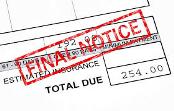Debt Validation/Debt Verification
 Debt validation (or Debt Verification) refers to a consumer’s rights to challenge/dispute a debt, and to require that a debt collector verify the amount and validity of the debt.
Debt validation (or Debt Verification) refers to a consumer’s rights to challenge/dispute a debt, and to require that a debt collector verify the amount and validity of the debt.Under the Fair Debt Collection Practices Act (FDCPA), you are entitles to receive written verification of a debt from a debt collector. Upon receiving a request for debt verification, a debt collector must stop its collection efforts and cannot resume them before double-checking the debt information with the original creditor and mailing you the verification, including the original creditor’s name and address.
The debt validation procedure was expected to reduce the numbers of incidents were debt collectors done on the wrong person or try to collect previously paid debts.
You need to act quickly
Under the FDCPA, you can dispute all or any part of a debt, but must do so within 30 days of the first notice of the debt, in writing.
Upon receiving a timely debt verification request, a debt collector must cease debt collection activity until it responds to your request. If a debt collector fails to respond or to validate your debt, you also have the right to dispute the information with the credit bureaus.
Furthermore, if a debt collector has fails to respond or validate your debt but continues collection activities, you have the right to file law suit against him.
Remember – you MUST react within 30 days of the first notice of debt to trigger these rights!
What constitutes proper debt validation?
Unfortunately, the FDCPA does not define what constitutes proper debt validation, which leads to confusion and various interpretations. The issue has not been fully resolved by the courts either.
The FDCPA states that a debt collector must respond with “verification of the debt or a copy of a judgment, or the name and address of the original creditor, and a copy of such verification or judgment, or name and address of the original creditor“.
While some courts adopted high standards of debt validation, others have adopted a relatively low standard as in the case of Chaudhry v. Gallerizzo where the Court of Appeals ruled that “Verification of a debt involves nothing more than the debt collector confirming in writing that the amount being demanded is what the creditor is claiming is owed; the debt collector is not required to keep detailed files of the alleged debt.”
Furthermore, the FDCPA does not set a limiting time frame in which a debt collector must respond to your request for debt validation. However, it DOES state that a debt collector must cease all debt collection activity until a response is sent to you my mail.
What if a debt is not verified?
As stated above, there is no defined time limit in which a debt collector must respond. However, if you sent a timely debt verification request – a debt collector must cease all collection activities and may not legally continue to pursue the debt.
If a debt collector continues to pursue the debt – you may file a law suit against him.
Additionally, if the collection account was reported to the credit bureaus and is showing on your credit report – it is advisable to dispute the account. In such case include a copy of the debt verification letter with the dispute letter.
A sample debt verification letter can be found here.
Return from Debt Validation/Debt Verification to How to Repair Bad Credit Page
Return from Debt Validation/Debt Verification to Credit Report 101 Home Page
